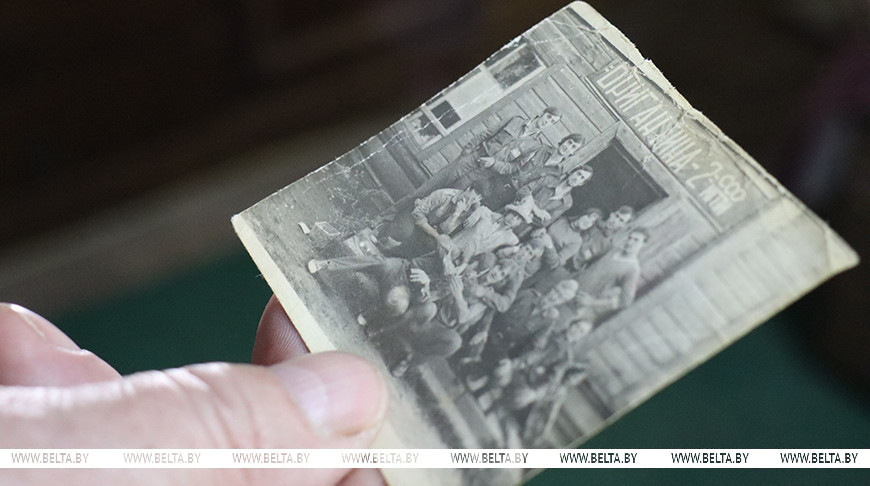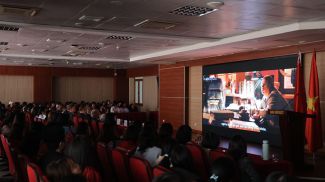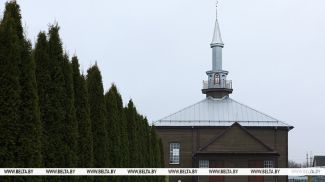
At the end of 2024, Belarusian President Aleksandr Lukashenko attended a nationwide meeting of student teams in Minsk. At the forum, the head of state was shown an interactive exhibition about the history of the student team movement. The organizers also found a photo of the president. It showed Aleksandr Lukashenko in the company of his student team mates. “The guys have found unique photos. They say there are familiar members of the student teams. A land reclamation canal in Bykhov District. But unfortunately, they don’t have the original,” said First Secretary of the BRSM Youth Union Central Committee Aleksandr Lukyanov. Well, thanks to our subscribers we managed to find the original photo and now we will tell you its story.
Where did we find the photo and what do Pushkin's descendants have to do with it?
The original photo belongs to Anatoly Dudal. He hails from the village of Telusha, Bobruisk District. Before retiring Anatoly worked at the Minsk Production Association of Computing Equipment. After retirement he prefers to spend his free time in his hometown rather than the capital city. The head of state also loves this rural way of life - chopping wood, planting and harvesting.

Telusha, by the way, was once the home of the Belarusian branch of Aleksandr Pushkin's descendants. In 1881 the great poet’s granddaughter Natalya Aleksandrovna and her husband Count Pavel Vorontsov-Veliaminov settled near the village. Neither the count's house, nor the beautiful flower gardens, nor the shady alleys have survived to this day. What have survived is the outbuildings and St. Nicholas Church built by the Count, near which Natalya Aleksandrovna was buried.
We decided to go see the village.
The story of the photo with young Lukashenko
In 1968, Anatoly Dudal was called up for military service. After the army he got a job at Minsk Automobile Plant (MAZ), and a couple of years later he decided to enroll in Mogilev State Pedagogical Institute to major in physics and mathematics. Aleksandr Lukashenko attended the university in the same years.
“In 1974, I joined a student team that was engaged in land reclamation. There I met Aleksandr Lukashenko for the first time. His major was history. Our acquaintance took place in the student team,” Anatoly Dudal noted.
The students were busy improving a reclamation canal: they made fascine, filled the canal with crushed stone and edged it with turf. “It was a difficult job. Aleksandr Grigorievich is a sturdy guy, so we made the rounds doing this job. It's not that we were friends, we just did this common job,” Anatoly Dudal said.
In his youth Aleksandr Lukashenko was fond of football. Anatoly Dudal recalled that they played football a lot: “I noticed then that he was fast. In football you fall, you get up. He would get up very quickly. He had a good reaction.”
It wasn't an easy job. Besides, the students had to find ways to get food for themselves. They worked on a collective farm, but were paid little there. In order to get some money to buy essential products, they had to work really hard.
“Brigantine No. 2 was the building of a local school. I don't remember who took this photo. Someone suggested taking a photo, and we quickly gathered where we were standing. By the way, not the whole team is on the photo. There were more than 30 people in the team. A 9-year-old boy joined us,” Anatoly Dudal said describing the photo. “I managed to buy a uniform for student teams. The buttons were white, so I cut them off and replaced them with army uniform buttons,” he added.

Later, Anatoly Dudal came across the future president a couple more times. For example, during his studies, the dean once brought Aleksandr Lukashenko to their classroom to give a lecture on the events in China.
“I remember this clearly. He was introduced to us, and his lecture was captivating from the very beginning. Every time he entered the classroom, he was treated with respect,” said Anatoly Dudal.
How the Soviet Union was changing
According to Anatoly Dudal, back then no one could even imagine that such a huge and powerful empire as the Soviet Union could ever collapse. However, in the late 1970s, the Soviet society was losing its moral compass. For example, earlier factory workers would come to their workshops before opening, would start working at the crack of dawn and would try to do as much as possible, however, over time the social relations became more disingenuous.
“People thought one thing, said another, did a third. Many were growing fat on manipulating the system, to be honest. There were many people in the party committees and trade unions who were listed as employees, but never worked, they just enjoyed the trade union perks for the New Year. “There was a lot of trickery,” explained Anatoly Dudal.
Something similar was happening in the student environment. “When I took up work in a student brigade in 1976, I realized that it was a completely different brigade. The first one was like a fairy tale: everyone worked, everything was like a holiday. And this time, there were quite a number of fawning sycophants in our brigade who would send a telegram to Brezhnev saying: “Dear Leonid Ilyich, in your honor we did this and did that ...” And children of district committee chiefs were enrolled at the History Department, but did not care about anything. Everything was falling apart,” he said.
On the presidential elections
Anatoly Dudal proudly admits that he always voted for Aleksandr Lukashenko, including in the first presidential election. “First of all, we come from the same university. Secondly, I knew that he did not like disingenuity,” he explained.
According to him, in his youth, Aleksandr Lukashenko had a sharp sense of justice, he could not tolerate wrongdoing. Aleksandr Grigorievich has not changed.
“He has achieved everything only thanks to his intelligence and hard work. No assistance, no connections. And when he became president, I thought: well, hold on, swindlers, you will face the music,” said Anatoly Dudal. “It was a total mess and we were fed up with it. The recession in the 1990s was hard: empty store shelves, arrears of wages, no work. I attended the BPF Party meetings, and I saw [Zenon] Pozniak. Some advocated the Czechoslovak form of government. Let them adopt the Belarusian form of government now! They will see the result immediately. I also listened to [Stanislav] Shushkevich. I got the impression that he did not know anything about governance. Everyone was trying to get into power for personal gain.”
According to Anatoly Dudal, Aleksandr Lukashenko’s main advantage was that he was a man of the people. “He knew well about the daily travails of ordinary people, in contrast to those who only knew the life of the establishment (they and their children lived very well). He worked all the way up the career ladder. He understood that it was pointless to demand anything from hungry people. It was necessary to feed people first. He saw the most important thing,” Anatoly Dudal said.

The country’s industrial flagships have survived thanks to the president’s efforts, Anatoly Dudal said. “I studied the BPF Party program. They wanted to shut down BelAZ in Zhodino as the plant did not generate any profit. Shutting down the plant was akin to erasing the whole city! There were similar plans for Minsk Tractor Works, Horizont television manufacturer. ‘Outdated TV sets’. Yet the Americans offered nothing good, just old technologies. Why do we need this junk?” he recalled.
Anatoly Dudal knows what he is talking about. He used to chair an election commission. He knows a lot of things firsthand: “Lukashenko has always polled the majority of votes. I was in contact with other chairpersons as well. Every time Lukashenko won (he does it honestly) some internet trolls immediately called me ‘an accomplice of fascism’. Was I supposed to rig something or what?”
“He has built a good system over the years. He has built the whole vertical. Look how strong his team is now compared to the first one. The tasks are clear. Some may not like his harsh statements. They all want to be treated gently as if we live in a fairytale. But if you want to stop wrongdoings you have to use tough language sometimes,” Anatoly Dudal said.
What would he say to the president if he met him? The man feels shy but says he would definitely wish him success. “He has done so much in these 30 years, in my opinion. All his predecessors combined would not have achieved that much,” Anatoly Dudal is convinced.
In his opinion, young people, unfortunately, cannot compare the current life with the situation in the 1990s. Therefore, they can easily give in to calls for provocations.
“They’d better travel less abroad and focus more on things at home. Everyone is now glued to computers, mobile phones... Maybe people's eyesight has simply gone down, and they see less,” Anatoly Dudal said figuratively.
On Soviet-style character formation and key to success
As we have mentioned before, we found the photo of Aleksandr Lukashenko thanks to our subscribers. This story came to light through Anatoly Dudal’s son, Vitaly. He works as a senior investigator at Minsk’s Central District Department of the Investigative Committee.
“When I saw this photograph in the media, I was excited. It had been kept in my father’s family album for 51 years, and I was amazed that it ended up in the media. My father took a very good care of this photo (just like all of his belongings). So it was not surprising that it was not lost. He did not allow it to be shown to anyone or displayed publicly, which is why no one knew about it,” Vitaly Dudal said.

He is not exaggerating: convincing Anatoly Dudal to give an interview was indeed a challenge.
“My father has always been a great motivator for me. For example, when I took up sambo, he said: ‘How are you going to do sambo with those thin arms and neck. You won’t succeed.’ That motivated me,” Vitaly Dudal noted.
Sambo classes inspired him to pursue a career in law enforcement. The family’s habit of watching detective shows and series also played a role. However, the young man was more drawn to the investigative aspect of the job, preferring action over sitting at a desk. That led him to choose the Investigation and Forensic Faculty at the Academy of the Ministry of Internal Affairs. The competition was 12 candidates for each spot. It took the young man a lot of work and dedication to get there.
“My current job involves working with an investigative team at crime scenes to study the evidence. We examine the scene, interview witnesses and retrieve surveillance footage. Our district is particularly challenging because it is full of entertainment venues and malls,” Vitaly Dudal explained.
The investigator remarked that he always admired the tough way people were raised in the Soviet period. Back then, men were able to do everything: repair shoes, fix cars and build houses.
“My father grew up during that time. Once I asked him about young Aleksandr Grigorievich. My father told me he was skilled and could do anything. So, when the president makes speeches, I understand that he really knows what he is talking about: be it livestock production, machinery operation or public administration. There is no pretense or falsehood in his words,” Vitaly Dudal emphasized.
He also added that he always followed his parents’ philosophy: if you want to achieve something, do not sit idle: act, work and grow.
“My father is almost 75 now, and I feel like I could listen to him forever. His stories always make me look at things from a different perspective. I have seen him in a new light, both as a person and as a father,” Vitaly Dudal concluded.














